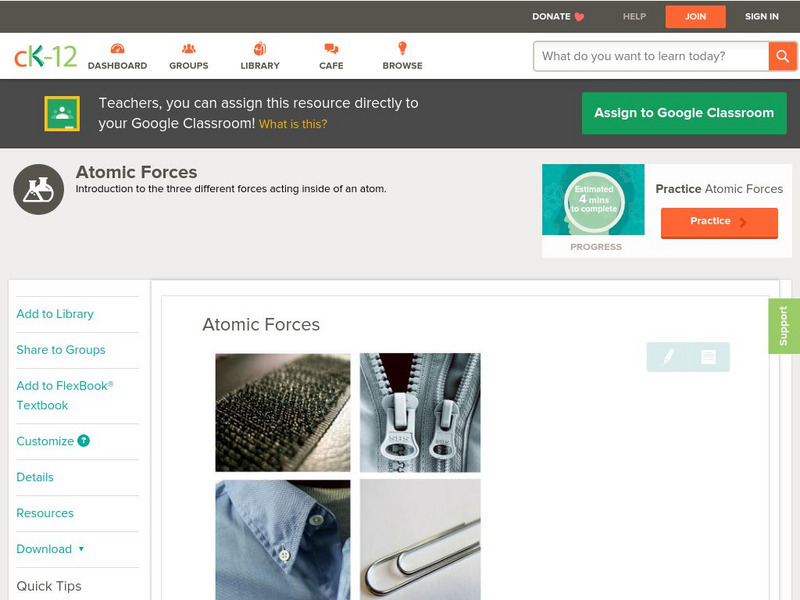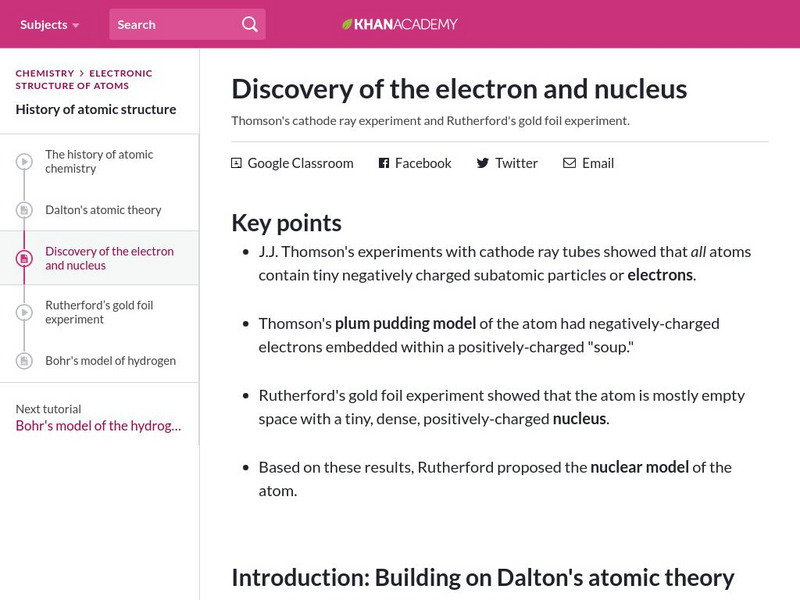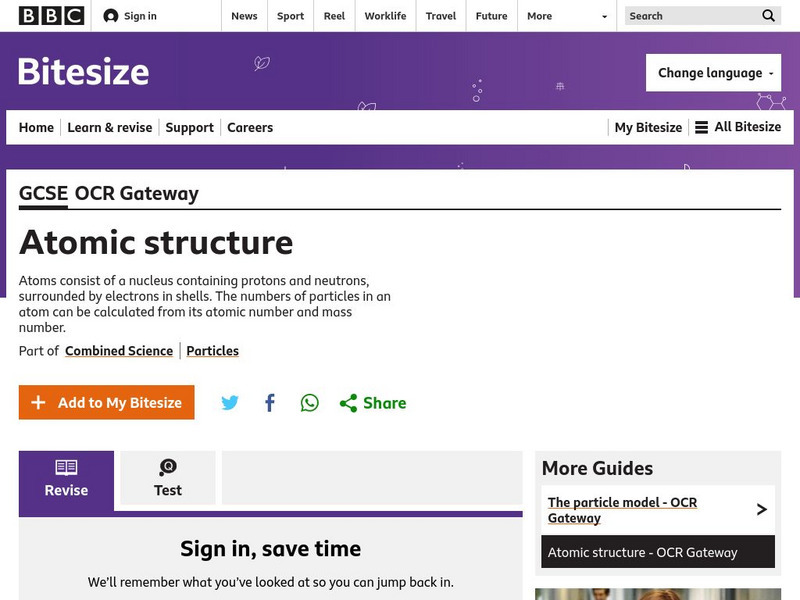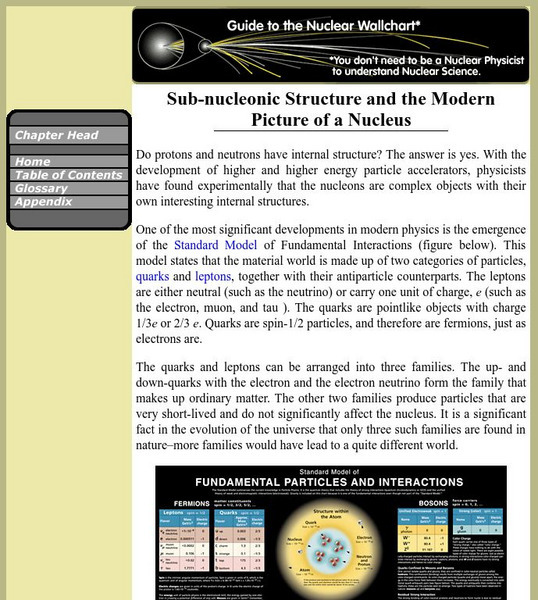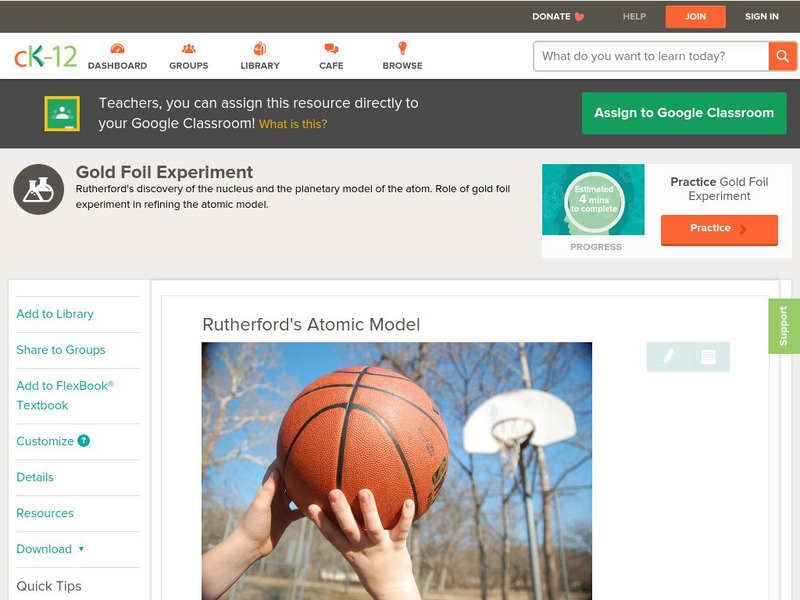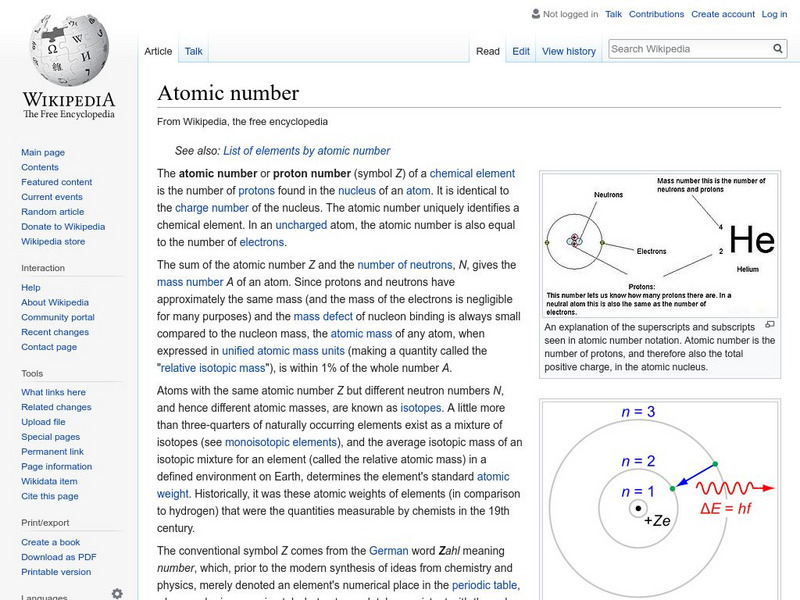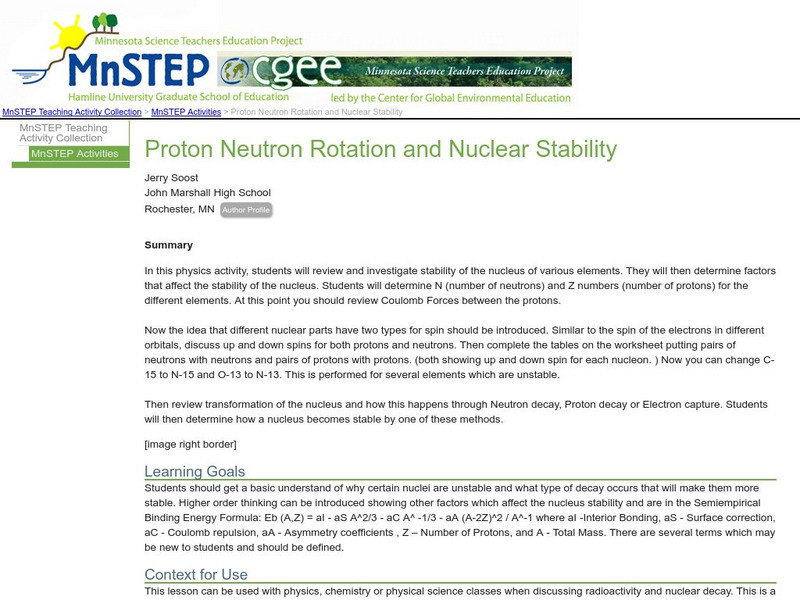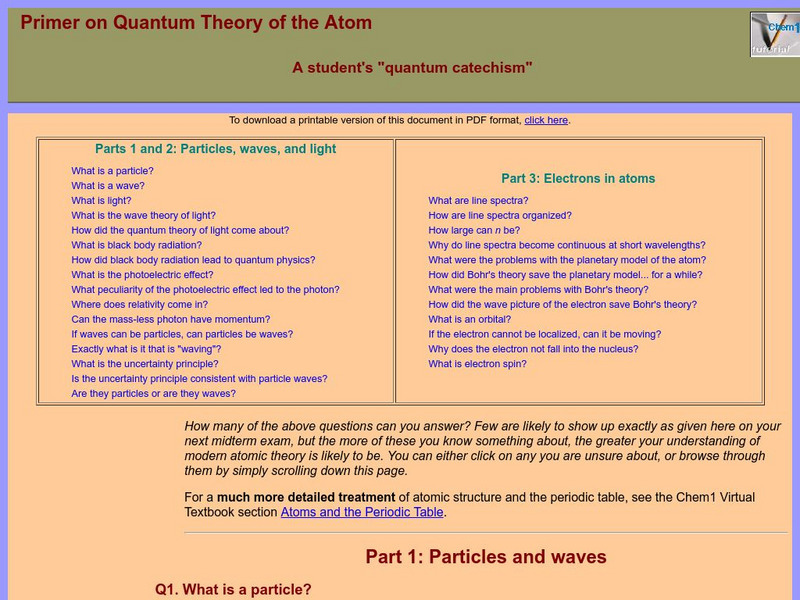CK-12 Foundation
Ck 12: The Nucleus and Isotopes
[Free Registration/Login may be required to access all resource tools.] In this lesson, students learn about the particles in an atomic nucleus, isotopes, and nuclear forces.
Khan Academy
Khan Academy: Mcat: Physical Processes: Atomic Nucleus: Decay Graphs and Half Lives Article
Explains how scientists can tell when radiation has been leaked, how to read a decay graph, what we mean by a half-life, and what carbon dating is.
Upper Canada District School Board
Tom Stretton's Chemistry Pages: The Nucleus
This online slide show presents the basic ideas behind the structure of the atomic nucleus.
CK-12 Foundation
Ck 12: Physical Science: Atomic Force
[Free Registration/Login may be required to access all resource tools.] Atomic forces and how they interact with particles.
Khan Academy
Khan Academy: Discovery of the Electron and Nucleus
Learn about Thomson's cathode ray experiment and the plum pudding model and Rutherford's gold foil experiment.
BBC
Bbc: Gcse Bitesize: Atomic Structure
This lesson focuses on the structure of atoms. All substances are made from atoms. Each atom is made of a nucleus - containing protons and neutrons - surrounded by electrons. It provides a link to an assessment.
Royal Society of Chemistry
Periodic Landscapes: Atomic Radii
This website provides a short but detailed definition of atomic radii. Also shows the atomic radius plotted against atomic number.
Wikimedia
Wikipedia: Atomic Radius
This site from the encyclopedia Wikipedia provides a basic definition for what the atomic radius is, and an explanation of what covalent and metallic radii are.
Lawrence Berkeley National Laboratory
Berkeley Lab: Sub Nucleonic Structure and the Modern Picture of a Nucleus
A simple explanation of the structures theoretically found within protons and neutrons. The resource consists of pictures and links to additional resources.
CK-12 Foundation
Ck 12: Physical Science: Rutherford's Atomic Model
[Free Registration/Login may be required to access all resource tools.] Rutherford's discovery of the nucleus and his planetary model of the atom.
CK-12 Foundation
Ck 12: Chemistry: Gold Foil Experiment: Rutherford's Atomic Model
[Free Registration/Login may be required to access all resource tools.] This site explains Rutherford's discovery of the nucleus and the planetary model of the atom and the role of gold foil experiment in refining the atomic model. It...
Georgia Department of Education
Ga Virtual Learning: Nuclear Physics
Through informational text, interactive activities, and virtual animations students learn about the atomic nucleus, fission, fusion, and radioactive decay.
Atomic Archive
Atomic Archive: Nuclear Fusion
From the Atomic Archive - the online companion to the award-winning CD-ROM. This page defines nuclear fusion and depicts the process by an informative diagram. Includes numerical values which describe the typical energy values for fusion...
Science Education Resource Center at Carleton College
Serc: Quantum Atomic Structure
This multi-day lesson plan helps learners to understand how the models of the atom have changed and how quantum mechanics affects the electrons as they orbit the nucleus.
Wikimedia
Wikipedia: Atomic Number
Wikipedia provides the definition of the term, "Atomic number," a term used in chemistry and physics to represent the number of protons in the nucleus of an atom.
Physics Aviary
Physics Aviary: Practice Problems: Binding Energy of a Nucleus
Determine the binding energy per nucleon for a random isotope.
Other
Walter Fendt: Ley De La Desintegracion Radiactiva
Learn how you can find the probability of survival but cannot predict the time of disintegration of an atomic nucleus with this simulation. This site is best viewed with Internet Explorer.
Famous Scientists
Famous Scientists: Aage Bohr
Learn about the life of Aage Niels Bohr, and see how his work was pivotal in the development of the theory of the structure of the atomic nucleus.
PBS
Pbs Learning Media: Atomic Structure
Take a look at the parts of an atom and learn about its properties.
Science Education Resource Center at Carleton College
Serc: Proton Neutron Rotation and Nuclear Stability
In this activity, learners will review and investigate the stability of the nucleus of various elements and determine factors that affect that stability. Students will get an understanding of why certain nuclei are unstable and what type...
CK-12 Foundation
Ck 12: Nuclear Stability and Binding Energy
[Free Registration/Login may be required to access all resource tools.] In this lesson, students learn how scientists study the properties of stable nuclei in order to draw generalizations about what makes a nucleus stable. They look at...
CK-12 Foundation
Ck 12: Physics Simulation: Marie Curie's Classroom
[Free Registration/Login Required] Study the basics of radioactive decay and the properties of atomic nuclei in Marie Curie's laboratory and classroom. A PDF worksheet and a video tutorial are also available. [3:32]
Sophia Learning
Sophia: Ernest Rutherford: Lesson 2
This lesson explains Rutherford's gold foil experiment and the discovery of the nucleus. It is 2 of 3 in the series titled "Ernest Rutherford."
Simon Fraser University
Chem1 Virtual Textbook: What Is an Orbital?
Acting as part of an overview on quantum theory, this section of the site deals with electrons and orbitals. In addition to explain what an orbital is, the site explains the movement of the electron in relation to the nucleus.



